| |

Traditions, folklore, history and more. If it's Irish, it's here. Or will be!
"People will not look forward to posterity who never look backward to their ancestors."
-Edmund Burke




Quotes
Library: Books, Movies, Music
Prints & Photos
Poetry
Jokes


Shops Ireland
Bunús na Gaeilge
(Basic Irish)
Circle of Prayer
Blessings
Did You Know?
Himself/Herself
Write to Us
Readers Write..
Links/Link to Us
Advertise with us
Awards & Testimonials
Submissions Guide

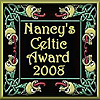
|
|
|
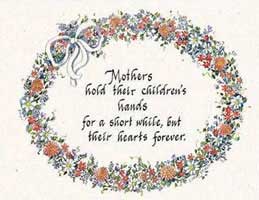 Mothering Sunday in Old Ireland Mothering Sunday in Old Ireland
by Bridget Haggerty
In Ireland and the UK, Mothering Sunday or Mother's Day is always on the fourth Sunday of Lent. In the USA and other countries, it is celebrated on the second Sunday in May. Whenever you honor the matriarch of your family, the origins and customs of her special day are fascinating.
The earliest Mother's Day celebrations can be traced back to the spring festivities of ancient Greece, in honor of Rhea, the Mother of the Gods. In Rome, the most significant Mother's Day festival was dedicated to the worship of Cybele, another mother goddess. Ceremonies in her honor began some 250 years before Christ was born. This Roman religious celebration, known as Hilaria, lasted for three days - from March 15 to 18.
As Christianity spread throughout Europe, mother's day celebrations were held on the fourth Sunday in Lent - Laetare Sunday or mid-Lent Sunday - and they were adapted to honor the Virgin Mary and also the "Mother Church." Custom began to dictate that a person visit the church of his/her baptism on this day and people attended the mother church of their parish, laden with offerings.
Eventually, the custom of making donations to one’s Mother Church expanded to include honoring one’s own mother; young people, such as servants and apprentices, were given the day off to visit their mothers and take gifts of food, which sometimes included a special “mothering cake.” Often, this would be a very rich fruit-laden concoction called a simnel cake. They would also bring her bouquets of spring flowers which were blessed in church first. And, it was customary for sons and daughters to take on the mother’s chores.
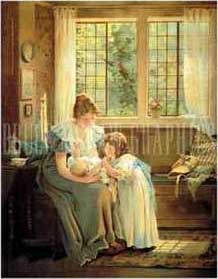 By 1935, the custom of keeping Mothering Sunday had lapsed in Europe, but was revived again after World War II. It came as a complete surprise to this writer to learn that its revival was brought about through the influence of American servicemen stationed overseas. In honoring their mothers on the 2nd Sunday in May, which had been instituted in the USA in 1907, they brought back for the people of Ireland, Great Britain and other European countries, the centuries old tradition of paying homage to mothers, but, as in the old days, Ireland and her geographic neighbors reverted back to keeping it on the 4th Sunday in Lent. By 1935, the custom of keeping Mothering Sunday had lapsed in Europe, but was revived again after World War II. It came as a complete surprise to this writer to learn that its revival was brought about through the influence of American servicemen stationed overseas. In honoring their mothers on the 2nd Sunday in May, which had been instituted in the USA in 1907, they brought back for the people of Ireland, Great Britain and other European countries, the centuries old tradition of paying homage to mothers, but, as in the old days, Ireland and her geographic neighbors reverted back to keeping it on the 4th Sunday in Lent.
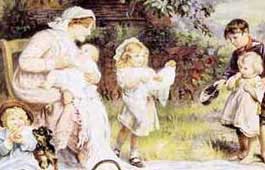 This difference in dates caused me a lot of grief when I first came to the United States. Many a letter from my dad chided me for forgetting ‘mam’s day. Eventually, he caught on and would let me know ahead of time when it was. Of course, there were no cards available in the shops here, but I later learned to buy several at a time. This difference in dates caused me a lot of grief when I first came to the United States. Many a letter from my dad chided me for forgetting ‘mam’s day. Eventually, he caught on and would let me know ahead of time when it was. Of course, there were no cards available in the shops here, but I later learned to buy several at a time.
It doesn’t take much to please a mother - mine was just so happy to hear from me, I could have sent a greeting on fly paper! I can also still remember the gifts we used to give her when I was just a girl - and her predictable reaction: To the inevitable dark blue bottle of Evening in Paris - “ye can’t have too many of these.” Or, if the resources would allow, perhaps a set of Yardley Soaps: “And won’t I be cleaner than the Queen herself.” Then, many years later, when she’d be given something nice to wear: “A fine buckle is a great addition to an old shoe.”
For the most part, she was happiest when she could put her feet up and let my dad and my brothers bustle about the house - and make a horrible mess of her kitchen. From the burned eggs on cold toast for breakfast to a very unbalanced dinner of sausages and mash (mashed potatoes) followed by a Lyons Swiss Roll (jelly roll spongecake) for dessert, we did our best to make her day off as nice as we could. I’d give anything to be able to do that again; I miss her so very much.
Which brings me to a lovely email I received from my good friend Judith Flynn. Think on this, if you’re lucky enough to have your mother still here with you. It's not Irish - but, the advice is universal:
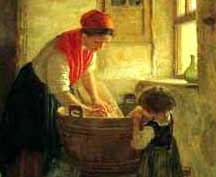 Mother’s Maintenance Manual Mother’s Maintenance Manual
Many of us take better care of our cars then we do our mothers and yet we only expect our cars to last 5 or 6 years, but we expect our mothers to last for a lifetime. May be we need a maintenance manual for mothers so we would know how to take care of them at least as well as we do our automobiles. Here are some items that might be included in such a manual.
•Engine: A mother's engine is one of the most dependable kinds you can find. She can reach top speed from a prone position at a single cry from a sleeping child. But regular breaks are needed to keep up that peak performance. Mothers need a hot bath and a nap every 100 miles, a baby-sitter and a night out every 1,000 miles, and a live in baby-sitter with a one week vacation every 10,000 miles.
•Battery: Mother's batteries should be recharged regularly. Handmade items, notes, unexpected hugs and kisses, and frequent "I love you's" will do very well for a recharge.
•Carburetor: When a mother's carburetor floods it should be treated immediately with Kleenex and a soft shoulder.
•Brakes: See that she uses her brakes to slow down often and come to a full stop occasionally. (A squeaking sound indicates a need for a rest.)
•Fuel: Most mothers can run indefinitely on coffee, left overs and salads, but an occasional dinner for two at a nice restaurant will really add to her efficiency.
•Chassis: Mothers run best when their bodies are properly maintained. Regular exercise should be encouraged and provided for as necessary. A change in hairdo or makeup in spring and fall are also helpful. If you notice the chassis begins to sag, immediately start a program of walking, jogging, swimming, or bike riding. These are most effective when done with fathers.
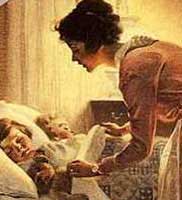 •Tune-ups: Mother need regular tune-ups. Compliments are both the cheapest and most effective way to keep a mother purring contentedly. If these instructions are followed consistently, this fantastic creation and gift from God, that we call MOTHER should last a lifetime and give good service and constant love to those who need her most. •Tune-ups: Mother need regular tune-ups. Compliments are both the cheapest and most effective way to keep a mother purring contentedly. If these instructions are followed consistently, this fantastic creation and gift from God, that we call MOTHER should last a lifetime and give good service and constant love to those who need her most.
and to all irish mothers, wherever you are: lá mháthair shona dhuit - God bless you on Mother's Day.
Would you like to say something to your mother in Irish?
Click here for our Basic Irish Mothering Sunday words and phrases.
 Resources: Resources:
Content: Chronicle of Celtic Folk Customs by Brian Day;
and also The Year in Ireland by Kevin Danaher.
Images: Mother's Hold their Children's Hearts by Karen Tribett, Good Mornin' baby by unknown, Enough and More to Spare by Frederick Morgan, Washing Day by Pierre Edouard Frere and Mother's Little Angel by Norman Rockwell
from All Posters & Art Prints
|
|
Fri, Sep 27, 2024
 The Galway Hooker The Galway Hooker
This unique vessel, with its distinctive curved lines and bright red sails, originated in the village of Claddagh. During the 19th century, hookers supported a significant fishing industry and also carried goods, livestock and fuel. Seán Rainey is remembered for building the last of the original boats, the Truelight, for Martin Oliver who was to become the last king of the Claddagh; as king, he was entitled to white sails on his boat. Since the mid seventies, many of the old sailing craft which were on the verge of extinction have been lovingly restored and new ones have been built. During the summer months they can be seen at festivals such a Cruinniú na mBád - the Gathering of the Boats - in Kinvara.
Click for More Culture Corner.
A must read for all Irish women. Especially endearing was the story called "Trinity" written by Kerry Herlihy. A moving book. Click here for Motherland.
|
|
|




 The Galway Hooker
The Galway Hooker